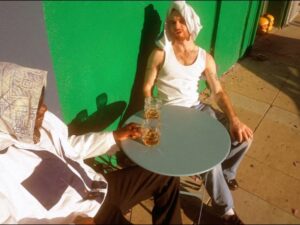Atlanta-based vocal producer, engineer, and songwriter Scott Taylor Jr. recently joined the Highstreet Podcast for an in-depth conversation about his rise in the industry, the intricacies of vocal production, and his work philosophy. The episode offered valuable insights, particularly for young independent producers and engineers eager to hone their craft.
Taylor, who recently tied the knot after five years with his partner, started his professional journey interning at Blue Room Studios after college. His work with Atlantic Records’ Mean Street Studio and producers like Tricky Stewart helped him build a solid foundation. With years of experience under his belt, Taylor has worked with both major labels and independent artists. However, he’s now more selective about label projects, citing issues with delayed payments and proper crediting as factors that pushed him toward greater independence.
One of Taylor’s defining traits is his versatility. He’s worked across a range of genres, including rap, country, and gospel. Currently, he’s collaborating on a country album with an artist named Milly, showcasing his ability to adapt and thrive in various musical landscapes. Taylor emphasizes the importance of being multidimensional, saying it’s crucial to be able to fill multiple roles in the studio—whether as an engineer, producer, or songwriter.
Taylor prefers using high-quality hardware like the Neve 1073 preamp and CL1B compressor during recording, but when it comes to mixing, he works “in the box” with digital tools. He highlighted his go-to gear, including Sony headphones and Audio Technica M40s/M50s, and detailed how he employs side-chaining, multiband compression, and subtractive EQ to create a polished mix. Taylor also shared his favorite plugins, mentioning the SSL Channel Strip, Fresh Air, and Soothe as key elements of his vocal chain.
One of Taylor’s key takeaways is the importance of humility in the studio. He believes ego ruins sessions, stressing that building rapport and fostering a positive environment is just as important as technical skills. He also discussed his approach to managing studio dynamics, noting how he ensures everyone stays focused by maintaining a professional yet relaxed atmosphere.
Taylor praised the collaborative nature of Atlanta’s music scene but cautioned against getting stuck in one genre, urging artists to expand beyond the local sound. He acknowledged that while Atlanta’s urban music scene is thriving, exploring other genres can open more doors.
The discussion also touched on the evolving definition of a “producer.” Taylor pointed out how the term has shifted from its traditional meaning—once referring to someone who oversaw the entire creative process, like Quincy Jones—to now often meaning a beat maker. He emphasized the importance of proper crediting for all contributors, from co-producers to engineers, noting that even small contributions deserve recognition.
Taylor offered a deep dive into vocal production, a role he says is often undervalued. He described it as more than just recording vocals—it’s about coaching performers, guiding their delivery, and ensuring the emotion comes through in every take. Whether it’s suggesting facial expressions or mic techniques, Taylor believes great vocal production can make or break a track.
The episode concluded with Taylor sharing advice for aspiring engineers and producers. He emphasized the importance of learning the fundamentals, understanding why certain techniques work, and always staying open to new ideas. His mantra? “Leave space for creativity and never let ego take over the room.”












